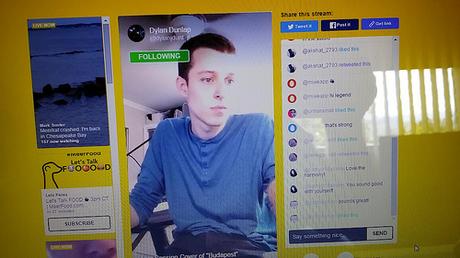 Meerkat, the hot new live video streaming app that took SXSW by storm, is backing away from Twitter and turning its attention toward building a closer relationship with Facebook to help attract more users. This is a strategic move, likely required by the fact that since the launch of Periscope, Twitter’s own live video streaming app, Meerkat has had a major competitor.
Meerkat, the hot new live video streaming app that took SXSW by storm, is backing away from Twitter and turning its attention toward building a closer relationship with Facebook to help attract more users. This is a strategic move, likely required by the fact that since the launch of Periscope, Twitter’s own live video streaming app, Meerkat has had a major competitor.
Meerkat’s Key UX Changes
In a nutshell, the changes are simple. Meerkat has changed its login procedures to include options beyond a Twitter account (which it probably should have thought about to begin with). Now, users can use Facebook to create a Meerkat account. In addition and as is the case with so many other apps, by using Facebook, you can connect automatically with all your Facebook friends who are also on Meerkat.
This is also big news for Facebook Page owners. Anyone who is following your brand page will also automatically be following your Meerkat account. For brands and publishers with large followings, this means thousands and possibility millions of additional followers instantly.
And Then, There’s Cameo
While that alone is pretty big news, Meerkat did something this week that could catapult it to a whole new level. “Cameo,” a new feature that allows a broadcaster to invite viewers to take over their stream for 60 seconds at a time, was introduced. When a user takes over a stream, their followers will be notified and encouraged to tune in via a push notification. Talk about instant growth in a follower base. This is pretty cool and there are lots of exciting ways this could be used.
The Facebook Factor
As mentioned earlier, the fast pace of new features and enhancements being rolled out to the Meerkat app shouldn’t come as much of a shock to anyone who has been following its battle with live streaming rival Periscope. The Twitter owned app has been taking much of the spotlight away from Meerkat ever since Twitter shut off access to its social graph. A Meerkat/Facebook relationship only makes sense.
According to a recent Re/code article, Meerkat CEO Ben Rubin believes the Facebook integration could help increase the “time spent” metric, especially if it gives bigger publishers more incentive to publish.
And, it’s no secret that Facebook is interested in the live video streaming space. According to Rubin, Facebook has been surveying users about how they use Meerkat and other streaming apps. Does this mean Facebook will acquire Meerkat? Maybe. “Facebook has been very nice and we have friends there that are helping us,” Rubin revealed to Re/code. “They’ve been supportive and very transparent.”
The budding relationship between Facebook and Meerkat seems to signal Facebook is not looking to build its own livestreaming app, but may instead look to acquire one. Perhaps Meerkat? I don’t think this live video conversation is about Periscope versus Meerkat any longer. With a Facebook integration, Meerkat is, to my way of thinking, moving into the power position. Twitter is not a sticky site, and it’s not a place where much engagement is happening these days. Facebook, on the other hand, well, I don’t need to tell you what’s going on there. Facebook is where the conversations and connections are happening, it’s where video views are happening, and it’s where video content is being shared.
From a personal standpoint, with a Facebook integration, I’m way more interested in live video streaming than I was when it was limited to a Twitter integration. What about you? Very much looking forward to seeing where this one goes.
Related Articles on this topic:
Native Video Views Skyrocket on Facebook: Marketers Take Note
Meerkat Makes Friends With Facebook’s API, Adds Viewer Cameos And Streaming Storage
Cut Off By Twitter, Meerkat Turns To Facebook For Views
photo credit: Dylan Dunlap via photopin (license)

